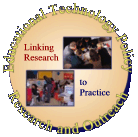Follow Up Homework/Read:
Introduction
Excerpts from Chapter 1: Education in the Digital Age from Teaching Every Student in the Digital Age provides a wonderful overview of this week's session.
Cultural, educational, and legal changes have significantly altered the mix of students in regular education classrooms. Today's typical classroom might include students whose first language is not English; students who are not reading on grade level; students with behavioral, attention, and motivational problems; students from varied cultural backgrounds; and students classified as gifted. In addition, there are students with particular needs, such as limited vision, motor disabilities, emotional difficulties, speech and language difficulties, and learning disabilities.
At the same time, increasing emphasis on learning standards places greater responsibility on teachers and administrators to ensure that each of these students reaches the highest levels of achievement. The Individuals with Disabilities Education Act (IDEA) 2004 (text available at http://idea.ed.gov/), preclude a separate educational agenda for students with disabilities and hold teachers responsible for ensuring that these students demonstrate progress within the general education curriculum. The Amendments indicate that high expectations and attention to access, as well as participation and progress within the general curriculum, are critical for improving outcomes for students with disabilities. Most of us would agree that these factors are critical for all learners.
The challenge posed by greater diversity and greater accountability is to enable students with widely divergent needs, skills, and interests to attain the same high standards. To transform the pressures of diversity into opportunities for all learners, we apply insights about learners who don't "fit the mold" to helps us create flexible curricula and tools that will work more effectively for everyone. In this way, the challenges we face as educators inspire us to reconsider the way curriculum is designed and the way schooling is conducted.
Fortunately, technological advances have equipped educators with tremendous new instructional resources in the form of computers and digital media. New technologies offer us the opportunity to respond to the multifaceted individual differences in our student population by providing more varied media, tools, and methods. Because of their inherent flexibility, digital technologies can adjust to learner differences, enabling teachers to (1) differentiate problems a student may have using particular kinds of learning media from more general learning problems and (2) draw upon a student's other strengths and interests that may be blocked by the exclusive use of printed text.
This session will explore how Universal Design (UD) can help ALL students in today's classroom setting
|
Readings:
Skim through the resources that you find of most interest
If you are interested in Digital Divide and Digital Inequity issues please explore more on this topic.
|




















